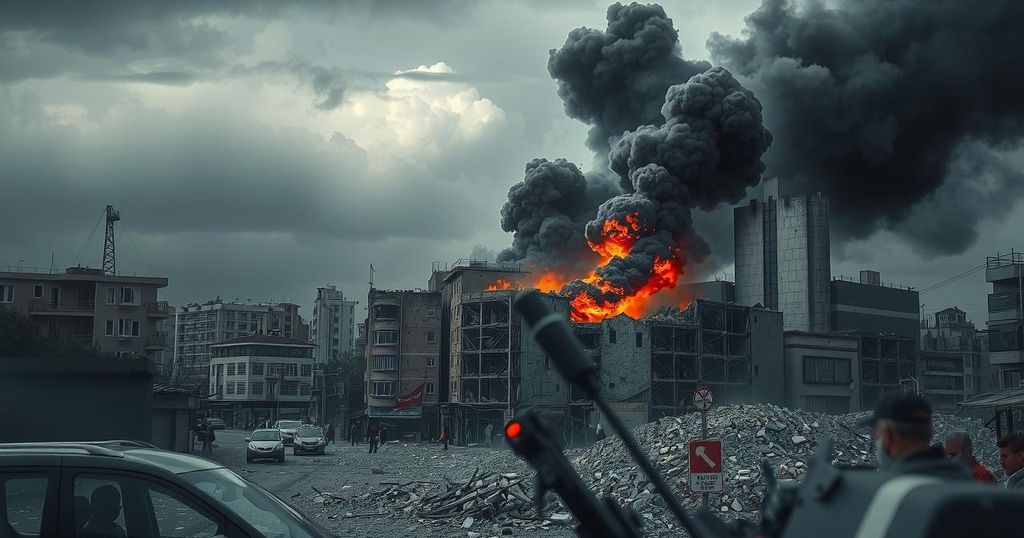Israel has declared it will enforce a ceasefire throughout Lebanon following rocket fire that prompted airstrikes on Beirut for the first time since a fragile truce. Lebanese officials described the strikes as a dangerous escalation, while Prime Minister Netanyahu threatened further military action. The situation has sparked widespread panic among residents, with calls for investigations into the attacks.
On Friday, Israel announced it would enforce a ceasefire across Lebanon following a recent rocket attack that resulted in airstrikes on Beirut, marking a serious escalation in tensions with Hezbollah. Lebanese Prime Minister Nawaf Salam characterized the airstrike on Beirut’s southern suburbs as a dangerous escalation, while French President Emmanuel Macron labeled it an unacceptable violation of the truce.
The Lebanese health ministry reported no casualties from the airstrike; however, earlier strikes in southern Lebanon reportedly resulted in five fatalities. This marks the second instance of rockets being fired from Lebanon since the ceasefire began in November, with Hezbollah asserting that it was not involved in either incident.
Prime Minister Benjamin Netanyahu emphasized that Israel would continue to enforce the ceasefire forcefully, stating, “The equation has changed” and affirming that strikes would target any threats to Israel throughout Lebanon. In support of this stance, Israeli Defense Minister Israel Katz warned that there would be no peace in Beirut if northern Israel continued to experience unrest.
Israel has persistently conducted airstrikes in southern and eastern Lebanon, claiming they targeted Hezbollah military installations in violation of the ceasefire. Despite ongoing hostilities, the airstrike in Beirut’s suburbs was the first since the ceasefire agreement and followed military warnings for residents to evacuate.
A report indicated that the airstrike targeted a location believed to store unmanned aerial vehicles (UAVs) belonging to Hezbollah’s Aerial Unit in Dahieh, a significant area for the group. At a joint press conference in Paris, Lebanese President Joseph Aoun suggested an investigation would be necessary, asserting that indications supported Hezbollah’s non-involvement in the recent rocket fire while insisting Lebanon’s stability must be preserved.
Following Israel’s threats, panic ensued within densely populated areas, and residents attempted to flee. One local resident expressed, “We’re very afraid the war will return.” The Israeli military reported that projectiles were fired towards Israel, with one intercepted while the other landed in Lebanon.
Hezbollah reiterated its commitment to the ceasefire, denying involvement in the rocket attacks. The ceasefire entails Israel’s troop withdrawal from Lebanon by February 18 and Hezbollah’s requirement to relocate its forces north of the Litani River and dismantle residual military infrastructure.
Prime Minister Salam has urged his military leadership to investigate the origins of the rocket fire threatening Lebanon’s stability. Moreover, Salam communicated with foreign officials, including the U.S. deputy special envoy for the Middle East, highlighting the international concern surrounding the ceasefire.
At the press conference, Macron stated he would discuss Israel’s actions with U.S. President Donald Trump and reiterated that there was no justification for such airstrikes. Meanwhile, Lebanon’s state-run news agency reported additional Israeli bombardments in southern Lebanon, leading to more casualties. UN special envoy Jeanine Hennis-Plasschaert expressed deep concern regarding the cross-border violence and emphasized that escalation into broader conflict must be avoided at all costs.
In conclusion, the recent Israeli airstrikes on Beirut following rocket attacks underscore increasing tensions between Israel and Lebanon, particularly with Hezbollah. The associated fears for local stability have compelled national leaders to urge investigations and international dialogue while emphasizing the need for a strengthened ceasefire. Both Israeli leadership and United Nations representatives have reiterated concerns that renewed conflict could destabilize the region significantly.
Original Source: www.al-monitor.com






